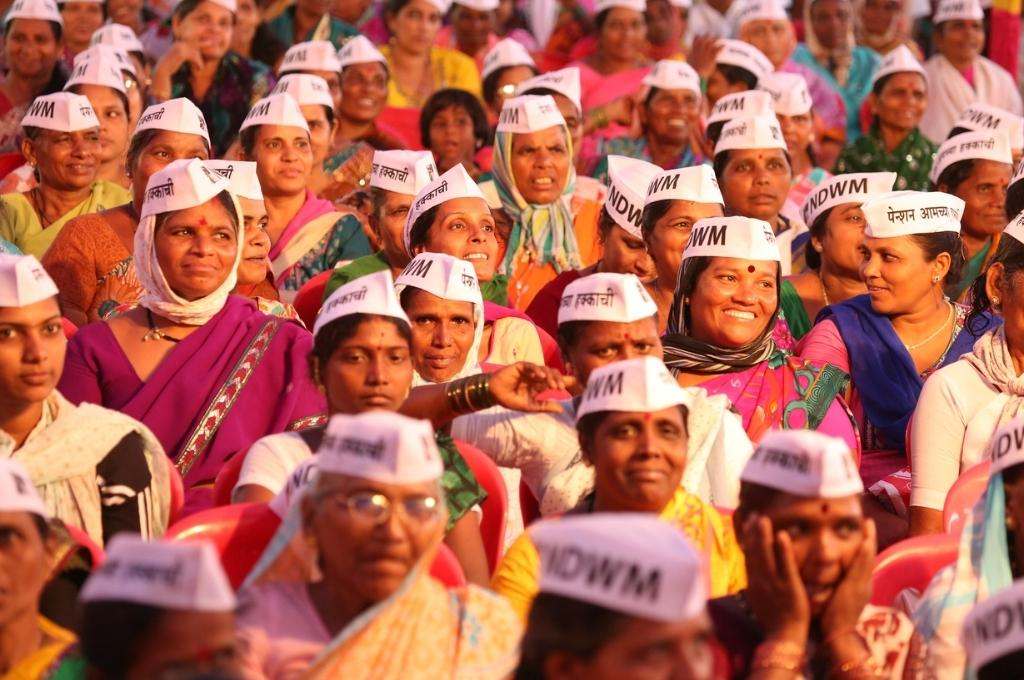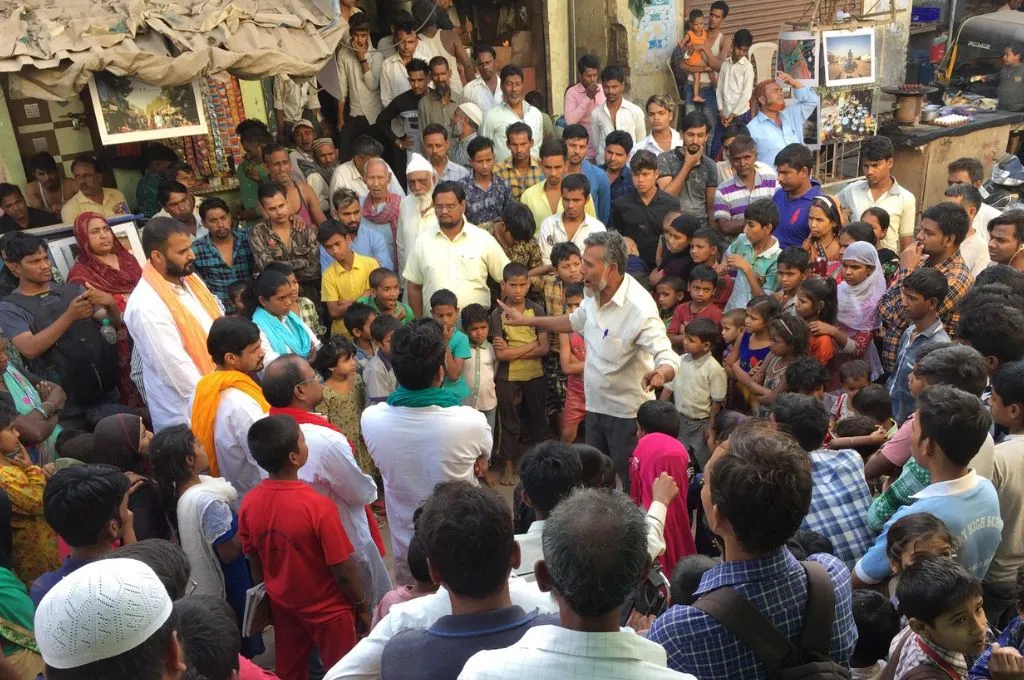The global COVID-19 pandemic has brought many lives to a standstill. In addition to grave health repercussions, it has resulted in a deluge of socio-economic and humanitarian suffering due to lockdowns and restrictions aimed at curbing transmission. As policymakers grapple with these conflicting pressures, millions of informal workers—domestic workers included—have faced tremendous uncertainty with regard to their work and income. Despite an easing of lockdown restrictions across India after the first wave, 45 percent of domestic workers faced some form of job loss. From those who managed to keep their jobs, many had to accept lower wages and faced working conditions fraught with health and safety risks.
Despite the launch of the national vaccination drive, domestic workers have been left wondering about the accessibility of vaccines. Runaben, a migrant worker from Bihar, was concerned that vaccine side effects could cost domestic workers (and other daily wage workers) two days of paid work. “Behen, aise time mei jaha kaam ki kami hai, agar ussmei teeka lenge aur do din chutti bhi, toh ghar kaise chalega?” (At a time where there is already a shortage of work, if we get vaccinated and have to miss two days of work, how will we run our households?). Runaben further highlighted a limitation of the mandatory online registration for the vaccines. She said, “Aapse phone pe baat karne ke liye Punam Devi ke ghar aayi hu, teeka ke liye naam kaise du?” (I have come to Punam Devi’s house to speak to you over the phone, how will I register for the vaccination online?)
In an effort to understand and articulate the challenges faced by domestic workers like Runaben during the first lockdown, SEWA’s learning hub carried out a study across Delhi, West Bengal, Bihar, Uttarakhand, Madhya Pradesh, and Gujarat in May 2020. Key findings revealed that 82 percent of domestic workers were not paid during the lockdown in 2020 and that 37 percent of them lost their work and livelihood opportunities altogether. As a direct consequence of this, 75 percent of respondents reported a change in diet due to reduced incomes.
Eighty percent of the surveyed domestic workers claimed to have suffered moderate to severe economic crisis.
Another study carried out jointly by SEWA and Women in Informal Employment: Globalising and Organising (WIEGO) in the Delhi NCR region in November 2020 corroborated these earlier findings. Eighty percent of the surveyed domestic workers claimed to have suffered moderate to severe economic crisis and only 20 percent reported any access to food rations. Additionally, 43 percent of the domestic workers claimed to have between three to seven dependents. When combined with the International Labour Organisation (ILO) estimates of 75-80 percent of domestic workers being the sole breadwinners in their families, the data paints a rather grim picture.
The condition of domestic workers in India
By definition, informal workers are susceptible to exploitation due to the absence of work security and social security. However, within this subset, domestic workers fare far worse than their counterparts in construction work and street vending who benefit from protective legislation. Consequently, street vendors and construction workers significantly out-earn domestic workers in both rural and urban contexts.
In fact, domestic workers were revealed to be the lowest paid amongst all the informal trades studied by WIEGO. This is despite the immense scale of the domestic work sector. Official estimates suggest that there are 4.75 million domestic workers in India; but this is likely to be a gross under-estimation and the real number is actually closer to 50 million. Moreover, domestic work is a trade dominated by vulnerable individuals such as women—who constitute 80 percent of domestic workers globally—and also includes minors.
The vast difference between the socio-economic realities of domestic workers and their employers produces a skewed power differential.
While some definitions of domestic work are broader and include roles such as gardeners, drivers, and watchmen, others only account for work done within the home, which is typically performed by women. This includes cooking, cleaning, childcare, and elderly care. Among these tasks, there exists a further hierarchy that mirrors caste-based attitudes towards purity and pollution.
For instance, most households hire different domestic workers for cleaning and cooking. It is also commonplace for employers to maintain separate cutlery for domestic workers. Many also suffer the indignity of having either no access to or separate access to toilets and elevators. While these practices may not directly be classified as ‘untouchability’, the fact that they are based on the nature of work is certainly a remnant of the caste system. It is also not a mere coincidence that a study conducted in Bangalore revealed that 75 percent of domestic workers surveyed belonged to Scheduled Castes while only two percent were from forward castes.

The vast difference between the socio-economic realities of domestic workers and their employers produces a skewed power differential. This in turn produces class-based friction and also maintains a relationship more akin to master and servant, rather than employer and employee. These dynamics are simultaneously a reason for and a consequence of the lack of policy protection. Class-based friction further produces mistrust and ill-will, and also leads to the misconception that power is a zero-sum game, due to which employers seem hesitant to support protective legislation for domestic workers.
Understanding the challenges to creating policy change
Domestic workers perform vital care work in millions of middle-class and wealthy households across the country, thereby allowing the women of these homes to participate in the labour force. So why has the policy response to domestic workers been so lethargic? A confluence of prevailing class, caste, and gender attitudes seems to constitute the bedrock of the resistance to policy change. Other factors include:
- The nature and site of work: Domestic workers work in homes, which are commonly considered ‘private’ spaces that must remain unregulated, making legislation difficult. Private homes additionally don’t satisfy the legal definition of a ‘workplace’ thus excluding domestic workers from all major labour laws. This results in domestic workers being underpaid and not regarded as ‘workers’ providing a specific service.
- Migration: A number of domestic workers are migrants who live in the homes of their employers and are therefore beyond the reach of trade unions and community-based organisations.
Together, these factors create physical and psychological barriers for domestic workers to demand rights by building political pressure through collective bargaining.
The status of domestic workers under Indian law
Despite less than favourable odds, domestic workers and their representative organisations have made small but important progress towards securing their rights. At the national level, domestic workers have been included under the Pradhan Mantri Jan Aarogya Yojana (PMJAY), the Sexual Harassment at Workplace Act, and the Unorganised Sector Social Security Act. Additionally, six Indian states have notified minimum wages for domestic workers while Maharashtra has set up a Welfare Board.
The unique vulnerabilities and work circumstances of domestic workers would be best addressed through a targeted act.
There appears to be a growing consensus around the basic provision of social security to domestic workers. However, the same consensus is missing in relation to other critical labour standards such as wages, conditions of work, and rights of association. Furthermore, while certain rights are gaining theoretical and legal legitimacy, their implementation remains piecemeal.
For instance, local complaints committees and welfare boards have not been constituted in most parts of the country (though required by law) and all reports suggest that the Maharashtra Welfare Board has been practically defunct for the past six years. Another issue is that wages notified under the Minimum Wages Act vary considerably between the six states in terms of who they cover, how they are calculated, and even in their amounts.
The way forward
While these policy gaps are important to bridge, the unique vulnerabilities and work circumstances of domestic workers would be best addressed through a targeted act. This would provide them with uniform rights and reduce their dependence on the largesse of individual employers. Convention 189 by the ILO—which has been ratified by more than 29 other countries—provides the most suitable blueprint for such a law. It outlines key areas that the law must cover including:
- social security and skill development
- regulation of working conditions (including working hours, overtime, and breaks)
- payment of wages
- rights of association
- protection from abuse
- occupational safety and health protections
- elimination of discrimination
- formal terms of employment
- regulation of private employment agencies
After a sustained lull, there has been renewed interest through the introduction of five private members’ bills in the Lok Sabha between 2015-2017 that cover some of the critical areas outlined by Convention 189. If India were to ratify Convention 189, perhaps these legislations would see the light of day.
While implementing policy measures has been long overdue, the pandemic has provided the perfect moment of reflection for catalysing action from the government and civil society. For instance, during the second wave, the Maharashtra government used established welfare boards as a vehicle to target and disburse benefits to informal workers. While this decision was applauded, it also highlighted the need to strengthen welfare boards by increasing registration and disbursements. Despite the Maharashtra government’s intention to disburse benefits to 25 lakh domestic workers in the state, the labour department announced disbursal of relief funds to only 1.05 lakh workers that were registered with the board.
As domestic workers’ unions use this moment to mobilise around demands for greater protection and welfare, employers could also play a role in not only furthering such demands but also in supporting their employees to get registered under existing welfare boards and welfare schemes like the Pradhan Mantri Shram Yogi Maan-dhan.
In addition to policy-based solutions, trade unions play a critical role in garnering rights for domestic workers.
In addition to policy-based solutions, trade unions play a critical role in garnering rights for domestic workers. They collectivise workers around a shared consciousness of their social, economic, and political rights and re-affirm their status as workers and as citizens. Such efforts have particular significance for women workers who are otherwise denied an identity as workers due to the nature of tasks they perform as domestic workers. It is crucial for trade unions to be included on welfare boards to boost registrations and to deliver more meaningful benefits to workers in keeping with their needs. States like Karnataka and Kerala—in which domestic worker unions have been active—have not only achieved implementation of minimum wages but have also included unions in the setting of wage rates.
Broadening the scope of our advocacy efforts, we at SEWA have been actively engaging with Residents Welfare Associations and employers of domestic workers. This effort has opened up a dialogue through which workers have raised awareness regarding their tribulations and rights, as well as the responsibilities that each employer should assume with respect to their workers. Building broad-based alliances and sensitivity towards domestic workers is essential to ensuring protection and dignity when it comes to informal workers, who buttress the lifestyles of urban India.
—
Know more
- Learn more about the National Platform for Domestic Workers.
- Read the ILO Convention 189 to understand more about the rights of domestic workers.
- See what welfare schemes the Maharashtra Welfare Board has in place for domestic workers.
Do more
- If you are an employer in Maharashtra, support domestic workers to register for welfare benefits online.
- If you are an employer in Bengal, support domestic workers to register online under the Samajik Suraksha Yojana.
- If you are an employer, support any domestic workers employed by to you register for the Pradhan Mantri Shram Yogi Maan-dhan, a pension scheme for unorganised workers.






